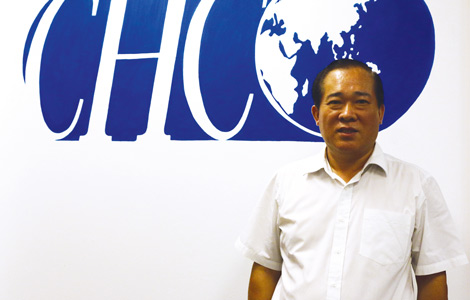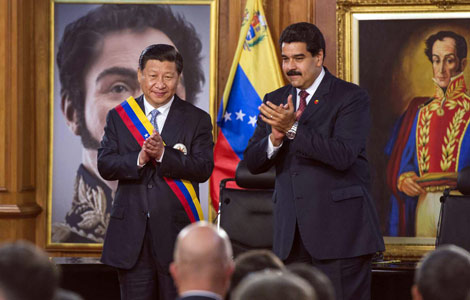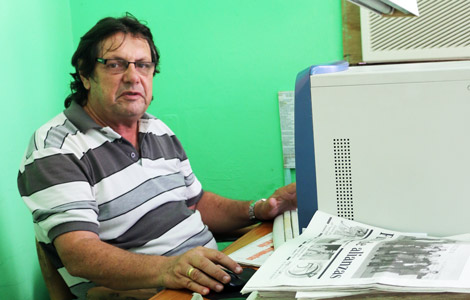BRICS bank should help the poor
Updated: 2014-07-23 07:37
By Kevin May (China Daily)
|
||||||||
At their summit in Fortaleza, Brazil, last week, the leaders of BRICS (Brazil, Russia, India, China and South Africa) announced the details of the much anticipated "New Development Bank", which will be headquartered in Shanghai and have an initial subscribed capital of $50 billion, and the $100-billion Currency Reserve Arrangement.
The idea of a BRICS development bank, to serve as a counterweight to the traditional donor countries and the US-EU led financial institutions like the World Bank and the International Monetary Fund, was first mooted at the 2012 BRICS summit in New Delhi.
At the Durban summit in South Africa last year, the BRICS member states announced their intent to launch the bank in 2014. Little else was revealed to the international community other than an agreed focus on "mobilizing resources for infrastructure and sustainable development projects in BRICS and other emerging economies and developing countries", and in a manner that will "supplement the existing efforts of multilateral and regional financial institutions for global growth and development".
This matters. The BRICS bloc has a special responsibility to help the world achieve its goal of ending extreme poverty, reducing inequality and achieving sustainable development, as its member states collectively face some of the world's greatest challenges and have made great achievements in these areas. Despite the remarkable strides taken by China, Brazil and India to reduce poverty, BRICS countries are home to nearly half the world's poor and, with the exception of Brazil, have experienced a rise in inequality in recent years.
Oxfam believes that the creation of a development bank offers a real and concrete opportunity for the governments of BRICS countries to ensure that development financing is sensitive to the needs of the poorest and the most marginalized. Besides the potential for extra resources for development financing, the new bank could pave the way for a more democratic global development architecture.
Yet details of what is planned are sketchy, and little is in the public domain. This needs to change. It is time for the discussion to move beyond the BRICS governments' current focus on technicalities around capital contribution and governance, and instead provide a solid vision for its mandate, the principles, priorities and objectives on which the new bank's activities and operations should be premised. BRICS countries should seize the opportunity to go beyond the growth-oriented development agenda toward more inclusive and sustainable solutions to end extreme poverty.
Therefore, the BRICS bank should be an instrument to promote pro-poor policies, food sovereignty and rural infrastructure, create sustainable jobs, improve livelihoods, and reduce the gap between rich and poor and between men and women, within the BRICS countries, as well as in other partner countries where projects will be implemented.
So what needs to be done? First, it is essential that the BRICS bank is operated in a way that puts fighting poverty and inequality at the heart of its mission. Second, the bank must be transparent and accountable both to BRICS citizens - whose money will form the bank's capital - and to people in borrower countries. And third, it needs to institute safeguards that protect and promote the interests of everyone affected by the projects it funds.
Among the five BRICS member states, China has made the largest contribution ($41 billion) to the Currency Reserve Arrangement, with Brazil, Russia and India contributing $18 billion each, and South Africa putting in $5 billion. But China could do more than just contributing to the bank's subscribed capital and the reserve pool. It could also make it work for the poor.
China has lifted more people out of extreme poverty than any other BRICS country (or for that matter any other country in the world) through reforms in rural areas, which include relatively equitable land distribution, complete rescindment of agricultural taxes and investment in infrastructure, supplemented by robust poverty alleviation programs in those areas. Chinese national development banks have a rich experience of making such reforms work, especially in the development of agriculture, rural infrastructure and support to small-scale enterprises. Moreover, already lending more to developing countries than the World Bank, the Export-Import Bank of China requires the offshore projects that it finances to conduct environmental and social impact assessments and respect local people's rights to land and resources.
China has an unprecedented opportunity and responsibility to draw upon these experiences to make the BRICS bank put the interests of the poor right on top of its agenda. It is an opportunity that has to be seized, for the sake of China and for the sake of the people living in poverty throughout the world.
The author is manager of China and the Developing World, China Programme Unit, Oxfam Hong Kong.
(China Daily USA 07/23/2014 page13)

 Chinese business leader feels at home in Cuba
Chinese business leader feels at home in Cuba
 Cuban artist seeks threads of humanity
Cuban artist seeks threads of humanity
 HK Children's Symphony Orchestra performs in NYC
HK Children's Symphony Orchestra performs in NYC
 President Xi honored in Venezuela
President Xi honored in Venezuela
 A bike ride helps Cuban editor fit into Chinese society
A bike ride helps Cuban editor fit into Chinese society
 Chinese students fall for Cuba
Chinese students fall for Cuba
 Angel Model Contest
Angel Model Contest
 Osmani Castillo — Cuban chef came to China for love
Osmani Castillo — Cuban chef came to China for love
Most Viewed
Editor's Picks

|

|

|

|

|

|
Today's Top News
Xi visits old friend Fidel Castro at home
New scare hits fast food chains
Investigators examining MH17 victims
Beijing, Caracas sign multiple agreements
Syndrome killing young workers in 'world' s factory'
RMB developing quickly as major world currency
China, Cuba to further advance ties
Chinese get to know Cuba through salsa
US Weekly

|

|






